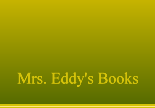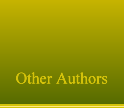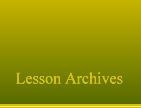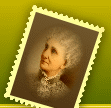|
Part III
CHRIST AND CHRISTMAS
In several places Mrs. Eddy tells us that her book,
Christ and Christmas, is her life story, and that in Christ and
Christmas the star of Bethlehem is really the "STAR OF BOSTON," though it
was too early to say this to the general public at her time. Christ and
Christmas is about Mary Baker Eddy, the Wayshower who brought the Second
Coming of the Christ in fulfillment of Jesus' prophecy to send the "Comforter"
to reveal all that Jesus, 2000 years ago, was not able to tell the people of
his time, as they were just coming out of mythology.
There can be no doubt that the poem and pictures in
Christ and Christmas reveal the high points and deep significance of
Mary Baker Eddy's life.
Irving C. Tomlinson writes regarding Christ &
Christmas:
Mr. James F. Gilman, the illustrator of this inspired
poem (whom I visited at Mrs. Eddy's request) has told us in his memoirs that
Mrs. Eddy once said to him: "Do you know what you have done? You have portrayed
to the world what I am as God's messenger to this age."
In seeking the lessons to be learned from the
illustrations of Christ and Christmas we must remember that our beloved
Leader has given us important data which should be kept in thought. She
describes Christ and Christmas as "hopelessly original" (Mis.
371:28). Of vital interest are her words in Miscellaneous Writings which
tell us that the illustrations 'refer not to personality ["Those who look for
me in person...lose me..."], but present the type and shadow of Truth's
appearing in the womanhood as well as in the manhood of God, our divine Father
and Mother'" (Mis. 33:8). Tomlinson adds, "These notes on Christ and
Christmas had the approval of our Leader, Mary Baker Eddy."
Nothing in Christ and Christmas lulls us to
sleep; it is front burner stuff all the way. To the spiritually-minded reader
every page of the book's incredible insights have a healing effect, for they
show how Science and Health is transforming the thinking of the world, just as
education transformed mankind's thought about the earth's flatness. Mrs. Orgain
writes: "The message of Christ and Christmas is expanding with every
approach, always revealing the wonderfully balanced view which is the result of
the manhood and womanhood of God operating in unity."
Sources
The information we will look at in Part III will come
primarily from two sources. The first source is Alice Orgain's insightful book,
Angelic Overtures of Mary Baker Eddy's Christ and Christmas, quoted
above. Mrs. Orgain explores how Christ and Christmas depicts the
spiritual history of the life of Mary Baker Eddy in coincidence with the
unfoldment of Science and Health. The first picture, she says, covers Mrs.
Eddy's experience previous to her discovery of Christian Science; the second
and third pictures cover her nine years of teaching and practice before she
established a church, and so forth.
Alice Orgain's book shows "not only the spiritual life
of Mary Baker Eddy in coincidence with the unfoldment of Science and Health,
but the limits of each phase of institutional church as it progresses to its
prophesied completeness, as illustrated in the pictures of Christ and Christmas
and as outlined in the poem and its Glossary."
The second source for Part III is an inspired and
thoughtful analysis entitled An Explanation of the Illustrated poem, Christ
and Christmas, with remarks by Judge Septimus J. Hanna and James F. Gilman.
This manuscript, which has been in print for many years, is believed to be
based on notes Judge Hanna made on at least one occasion when he was present
while Mrs. Eddy instructed the artist, James Gilman. Unfortunately no one seems
to know who the author of this piece is, nor have I succeeded in tracking down
the Hanna notes on which it is based. In the discussion that follows I credit
it to Judge Hanna cautiously, with a "?".
In this book we will alternately shine the light first
on Alice Orgain and then on the interpretation based on Judge Hanna's notes.
Important spiritual observations by John Pawlik will also be included as
appropriate.
Alice Orgain's Angelic Overtures is well over a
thousand pages in length. It therefore seems best to take from it only those
remarks most applicable to the ideas under consideration. Note-taking from
Alice Orgain's 1070-page book is complicated by the fact that Mrs. Orgain's
marvelous insight into Mary Baker Eddy's life made her want to pack everything
into one sentence, or one might say into one suitcase, even if it sometimes
meant leaving a sock or a bootstrap hanging outside.
More frequent use of periods would certainly have
enhanced what this great, spiritually-minded author brought to light. Where
punctuation is concerned, many, like Mrs. Orgain, have never met the most
beautiful mark of all. It is called the "period," a dot all
writers should love. The correct use of the period would surely give tired
readers, or even alert ones, a break.
In the following discussion of Christ and
Christmas, the reader is urged to remember that where ideas are drawn from
Alice Orgain's prolific spiritual explanations, much of the wording is also
hers. I have only paraphrased lightly to simplify the text, and added the
blessed period here and there. The language and concepts remain complex,
with much for the spiritually-minded reader to assimilate and understand for
himself.
The second source, An Explanation of the
Illustrated Poem, Christ and Christmas, with remarks by Judge Septimus J. Hanna
and James F. Gilman, is much shorter than Mrs. Orgain's 1070 pages and the
language is more succinct. Therefore it is quoted directly, with comments by
this author inserted as needed for clarity. The same is true of the quotes from
John Pawlik, a good friend of this author.
In the book Christ and Christmas each of the
eleven pictures is paired with one or two stanzas of Mrs. Eddy's poem. The
GLOSSARY of Christ and Christmas also gives Scriptural texts that
are the basis of the sentiments in the verses corresponding to each picture. To
aid discussion of each picture, we will start each section with the picture
itself, and its title and number, followed by its portion of the poem and its
scriptural basis.
Sub-sections labeled "Alice Orgain," "Hanna?" and
"John Pawlik" will follow in that order, with occasional comments by the author
offered for clarification of the picture under consideration.
Both the Alice Orgain book and the analysis based on
Hanna's notes explore the symbolic content of the pictures in Christ and
Christmas in detail. The reader should note that these illustrations were
much clearer in the early editions. Much in them has become obscured by poor
rendering of the pictures. Thus some observations refer to elements which are
now impossible to see.
Symbolism in Christ &
Christmas
Before we look in detail at each picture, the reader
may find the following brief summary of symbolism used in Christ and
Christmas interesting. It is quoted from a three paged typewritten carbon
copy which bears the penned notation, "To Mrs. Orgain JEJ 5 April, 1949." It is
thought these notes were sent to Mrs. Orgain by Joseph E. Johnson after he read
her book, Angelic Overtures, published in 1941.
JOSEPH E. JOHNSON'S NOTES:
Christ and Christmas: An
interpretation by Judge Hanna, who was present [possibly more than once] when
Mrs. Eddy gave instructions to the artist.
The pictures are the objects of the references on
pages 115 and 116 of Science and Health:
Black in each picture is "first degree,"
depravity, lines 21-24.
Gray is "second degree," evil beliefs
disappearing, lines 26, 27.
White is "third degree," understanding, lines
2, 3, 4-10, (p. 116).
First Picture: Black, gross materiality, error,
unreality, Star of Bethlehem (which was really the "Star of Boston" but it was
too early [for Mrs. Eddy] to say this). The star is the Christ idea - Truth
appearing to the world to destroy error.
2nd Picture: Death of the First Degree - note
the ugly coffin. The black robe on Jesus' shoulders represents the cross. Note
woman in gray, in prayer. Note the man, [in] black [background,] Pharisaical
belief, showing astonishment. Note the woman in the coffin, eyes opening,
showing spiritual discernment.
3rd Picture: Quill of pen touched by divine
Light; candle is half-burned showing Mrs. Eddy's life was half-spent when she
discovered Christian Science. Clock on wall shows time is behind her. The
animated serpent [old theology], First Degree, would bite the heel of Truth -
Divine Light coming through the window (there must be an opening).
4th Picture Where is the star? The tree is
grotesque. Artist did not wish to paint this picture, no beauty in Christmas
tree which exists only to celebrate the birth and death of the human Jesus and
this belief is responsible for human birth, [mortal, material] beliefs.
5th Picture: One Shepherd and one fold; twelve
sheep, two figures blending into one, represents spiritual individualism [white
robed purity uniting "in one person masculine wisdom and feminine love,
spiritual understanding and perpetual peace]. The angel knows "Thy kingdom
is come; Thou art ever-present."] "Watch and Pray."
River represents Euphrates ["Divine Science encompassing the universe and man"
(S&H 585:14)], prophecy of the Mother Church is in background; light gray
note black steeple, First Degree, [despotic ecclesiastical] thought, old
theology.
6th Picture: Old belief leaving the bed;
medicine is behind him. Curtains, FIRST DEGREE, are drawn back, and light
coming through brings the theological thought in matter to state of prayer.
Note picture on wall, "Breaking through the clouds of darkness" etc. The
Woman's robe reaches base of bed and represents understanding, symbolizing her
thought reaching the foundation of sickness as merely error, hypnotic
suggestion, illusion, ignorance of divine being.
7th Picture: No barriers of age to Truth.
8th Picture: [Mary Baker Eddy took an hour each
night to know the truth for the world.]
9th Picture: Circle represents world. Note that
Jesus has laid off the robe, showing dominion. Take Christian Science to the
world, and in that light creation is shown anew.
10th Picture: Child thought sees or perceives
Truth. Woman [Science] knocking at the door of mortal mind.
11th Picture: Foreground is FIRST DEGREE,
[then] following the path of light up to the right way, leads beside "still
waters" and "green pastures." The cross, smaller one, represents
demonstrations; birds represent God's winged thoughts. Note white dove coming
from heaven with thought messages nearest the cross. Left side of picture
reached same destination, but the way is rugged.
Again, the mission of Christ and Christmas is
to lift Christianity into Science.
The notes quoted above agree to a marked degree with
the symbols identified in the longer manuscript, An Explanation of the
Illustrated Poem, Christ and Christmas, with remarks by Judge Septimus J. Hanna
and James F. Gilman, which strongly suggests that both sources accurately
reflect the content of Hanna's notes.
As we will see, Mrs. Orgain, as well as the
unknown author of An Explanation, and John Pawlik add some valuable
insights to the understanding of these symbols.
After each picture we thought you might like a little
laugh, so the following brief jollies represent notices that have been seen on
church bulletin boards. They were submitted to us by one of our email
subscribers.
|
The Rev. Merriwether spoke
briefly, much to the delight of the audience. |
Star of Boston book sections
Introduction | Part 1a |
Part 1b | Part 2 |
Part 3
Christ & Christmas
Pictures
1 |
2 | 3 |
4 | 5 |
6 | 7 |
8 | 9 |
10 | 11
Summary |
Conclusion |



















